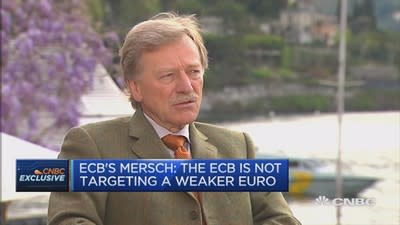ECB's Mersch warns on 'currency wars'

A key member of the European Central Bank (ECB) has highlighted tensions in the international currency markets, raising the threat that competitive devaluations could have on the euro zone's economic recovery.
Yves Mersch, executive board member of the ECB's key monetary decision-making body, told CNBC at the Ambrosetti Workshop in Italy that the central bank's "target objective" was not the exchange rate but stressed that it was important that stronger nations were not trying to weaken their own currencies.
"Everyone should be living up to promises (on) how the international monetary system is being run and that means there should not be a competitive devaluation, there should not be beggar-thy-neighbor policies. And the areas which (are) already more on the safer side, as what concerns both growth and inflation, should not try to talk down their currency" he said.
When asked about the strength of the dollar, he said that he "very much hoped" that there is a "strong re-confirmation" of how the international monetary system is run when the Intentional Monetary Fund meet in Washington D.C. later in April.
Mersch added that when it came to the Japanese yen, the Japanese economy was experiencing weakness that was similar to the euro zone's fragile recovery.
Following his comments, Giles Keating, the deputy global CIO at Credit Suisse, said he was "slightly surprised" about Mersch's concerns on other central banks.
"That did seem to give a tone of slight kind of almost disagreement across the central banks which we thought had been parked after that G-20 meeting (in Shanghai in February)," he told CNBC Friday.
There have been discussions in the last few years over whether countries are purposefully debasing their own currencies -- a concern that was termed "currency wars" by Brazil's Finance Minister Guido Mantega in September 2010. A weaker currency can help a country's export-focused companies and - in the case of China - can alleviate greater concerns about stalling growth. Central banks often stress that exchange rates are not a primary policy goal and can be seen more as a positive by-product of monetary easing.
"I only want to say that we have been careful when we modeled our package to really try to focus it on the internal side of the economy," Mersch added on Friday at the Ambrosetti Workshop when asked about the euro zone's exchange rate.
"And therefore also in our public statements we are careful to remain faithful to the international agreements that exchange rates should reflect fundamentals," he added.
He also confirmed that he did not want to over-emphasize the role of the euro's exchange rate. This gave the single currency a slight boost on Friday morning with the euro rising to 1.1389 at 10:00 a.m.m London time after hitting a session low of 1.1350. However, when discussing external shocks to the euro zone economy since its last council meeting he said that the foreign exchange market had "negatively surprised" members of the ECB.
In March, the ECB announced a greater-than-expected range of stimulus measures aimed at boosting a fragile recovery in the region. The most controversial of the measures was the cut in its deposit rate.
A negative rate effectively charges lenders who park cash at the central bank and many analysts were concerned that this could dent revenues at organizations that were yet to fully rebalance after the euro zone sovereign debt crisis.
The minutes of the latest meeting of the European Central Bank's Governing Council, released Thursday, said that the introduction of negative interest rates in the euro zone has been "broadly" beneficial for banks.
"Lowering the rate further into negative territory was seen as an effective tool for providing additional monetary easing, which also reinforced the impact of the other monetary policy measures in place by stimulating the 'velocity of reserves'," the minutes said.
Despite the reasoning, there was still caution from some inside the Frankfurt-based institution. The minutes stated - without revealing individual names - that concerns were raised about possible undesirable side effects that could arise from moving further into negative territory. There was also caution over potential further rate cuts, something President Mario Draghi even alluded to during his press conference on March 10.
But the bank would not rule out future cuts in policy rates, saying "new shocks could change the outlook for inflation, which might warrant further monetary policy action."
More From CNBC
Top News and Analysis
Latest News Video
Personal Finance

 Yahoo Finanzen
Yahoo Finanzen 
